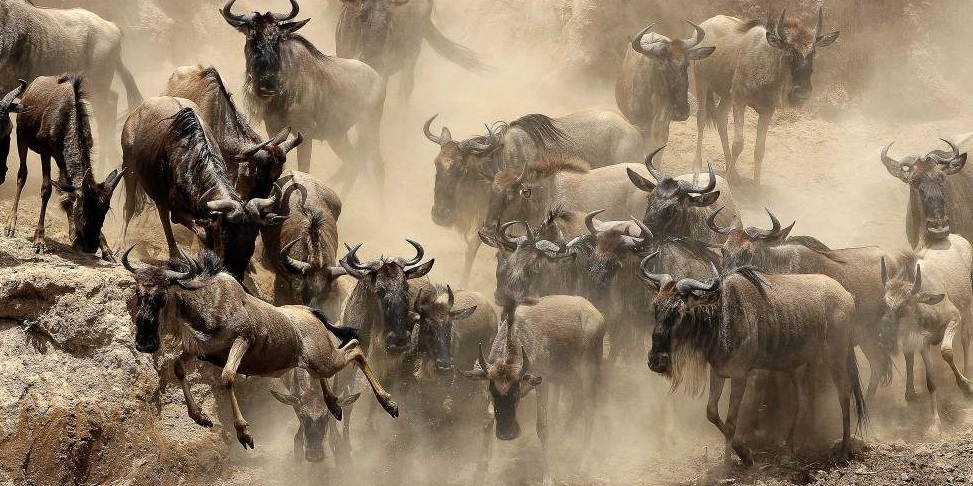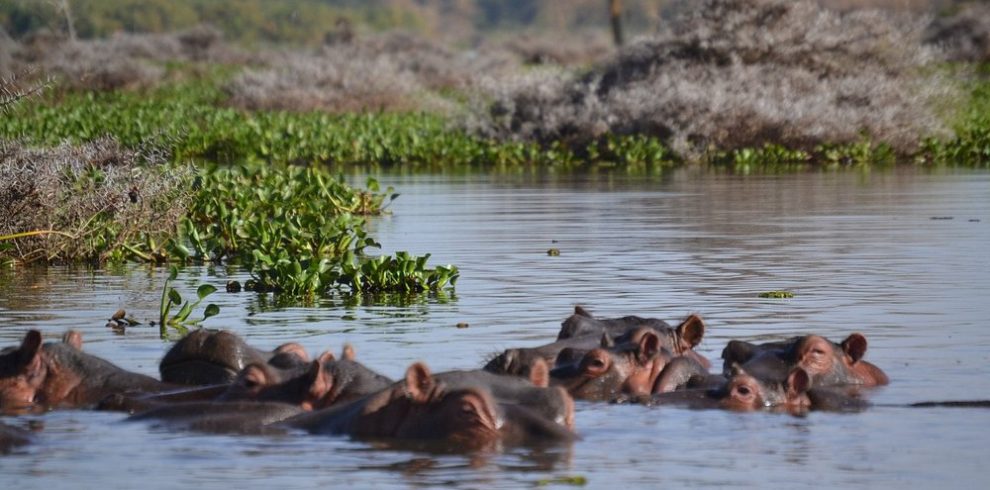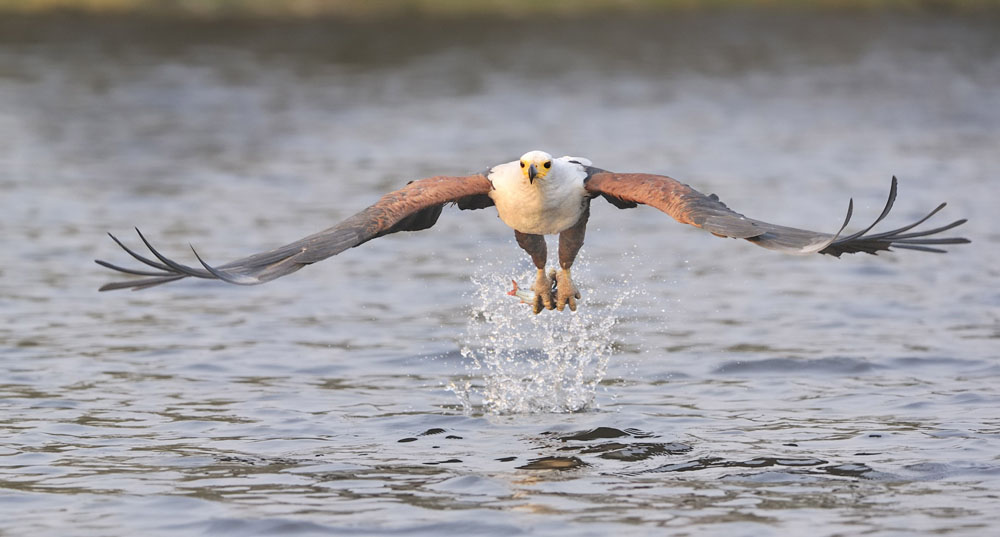
The African Fish Eagle, known scientifically as Haliaeetus vocifer, is one of the most striking and powerful birds of prey found in Africa. Sounding loudly with its signature call and the control it has over its surroundings, it has captured a niche in the minds and hearts of local people, bird watchers and nature lovers. This grand bird is always linked to vast water bodies of water and it is where it preys and survives. It is an emblem of power and the symbol of forever being strong in different African cultures. I
n this article, we will explore 5 fascinating facts about the African Fish Eagle, delving into its remarkable adaptations, behavior, and role in the African ecosystem.
1. The African Fish Eagle Has a Unique, Iconic Call
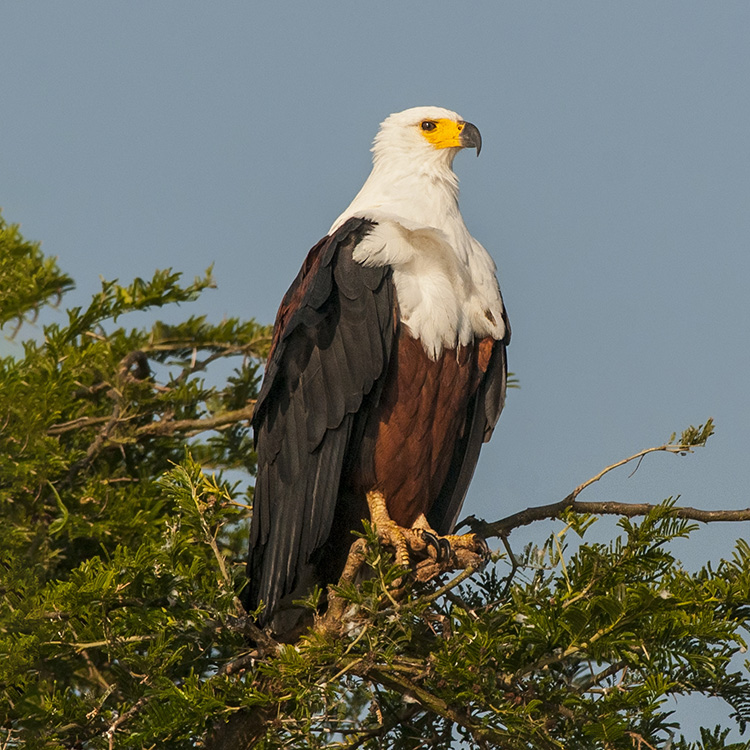
One of the most recognizable facts about the African Fish Eagle is its loud, haunting call, often described as a sound that embodies the wildness of Africa. This bird has a characteristic and a specifically high-pitched, yelping call that can be heard far away. In fact, the call of the African Fish Eagle is so iconic that it is often used in documentaries and films to evoke the essence of the African wilderness, even when the bird itself is not present in the scene.
The Meaning of The Call The call serves multiple purposes for the African Fish Eagle. It is applied in territorial communication particularly in times when males and females are forming and protecting their nesting territories during the breeding season. The call also serves to communicate to pairs where they tell the other ones their presence or action. It also informs the rest of the birds or other animals around giving alert to their presence of a possible predator or a competitor.
Verbal Symbolism and Cultural Significance Beyond its functional purposes, the call of the African Fish Eagle has become deeply ingrained in African culture. The bird as an object also carries symbolic meaning in most of the African customs and beliefs. Some African people have the Fish Eagle as a sign of power, bravery and liberty. Its call is perceived on the waterways in the continent the symbol of connection between the physical reality and the spiritual one.
2. The African Fish Eagle Is a Master of Fishing
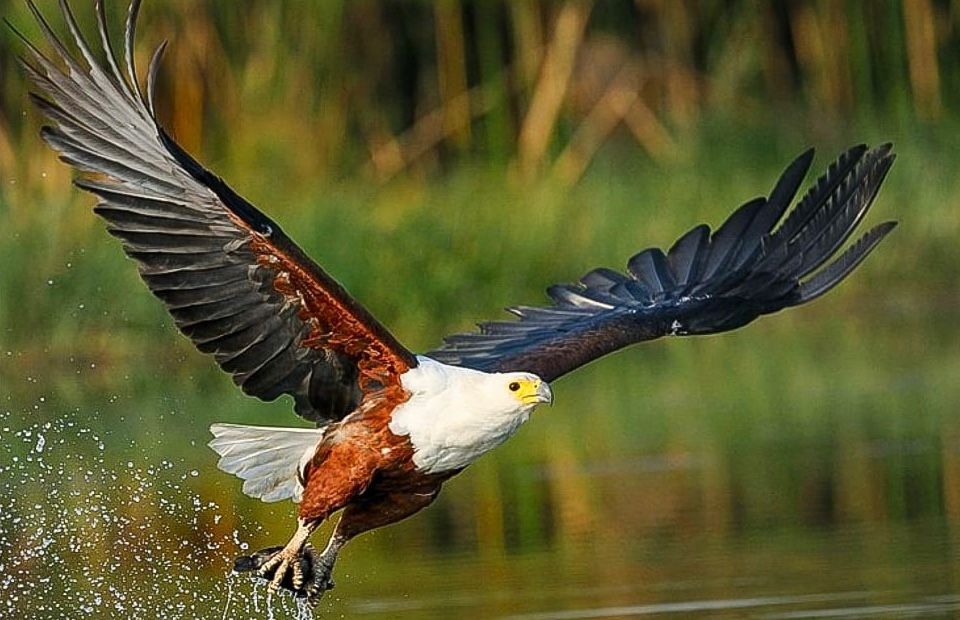
As its name suggests, the African Fish Eagle is primarily a fish-eating bird, and it has evolved to become an expert at hunting in aquatic environments. The sharpness of talons and the force of beak make this bird a rather good predator, yet nothing comes close to its extremely high talent and style of fishing when it comes to different bird of prey. Fishing adaptations The African Fish Eagle’s physical adaptations are perfectly suited for a life spent near water.
It has powerful hooked claws, which are curved in that they come to a sharp point and are made to catch and hold the slippery fish. The beak of the bird is also curved and has sharp grocery, capable of shredding into the meat of its prey. Another impressive detail is its good vision; the Fish Eagle is able to see fish on the water swimming at great distances and this ability is brought about mostly when they are in trees along rivers or on the lake shores.
Hunting Technique The hunting technique of the African Fish Eagle is both spectacular and efficient. The bird usually searches with its eyes, and then dives sometimes to show fresh water or a wetland and follows it. After identifying the fish, Fish Eagle plunges dramatically into the water with its sharp powerful talons to pick the fish out of the water.
The years of experience make the eagle a great hunter with specialized skills of hunting and an eagle can swiftly alter its course of flight or a dive during the behavior of its target. Fish Eagle is able to hunt and feed on almost all species of fish, small fry and large fish, as long as it is available and the size of the fish. It feeds, however, mostly on medium fish, e.g. tilapia or catfish, which are plenty in the water ways of sub- Saharan Africa.
Competition Fishing The African Fish Eagle’s exceptional fishing skills have made it a dominant predator in its environment, but it is not without competition. Other birds of prey, such as the osprey and larger raptors, also hunt fish, and the African Fish Eagle must often compete with them for food. In order to elude direct competition, these birds are likely to prey at dissimilar times of the day, or to different portions of one of the waterways. However, the African Fish Eagle’s ability to adapt to its surroundings and outmaneuver competitors ensures that it remains a top predator in its ecosystem.
3. The African Fish Eagle Has a Wide Range Across Africa
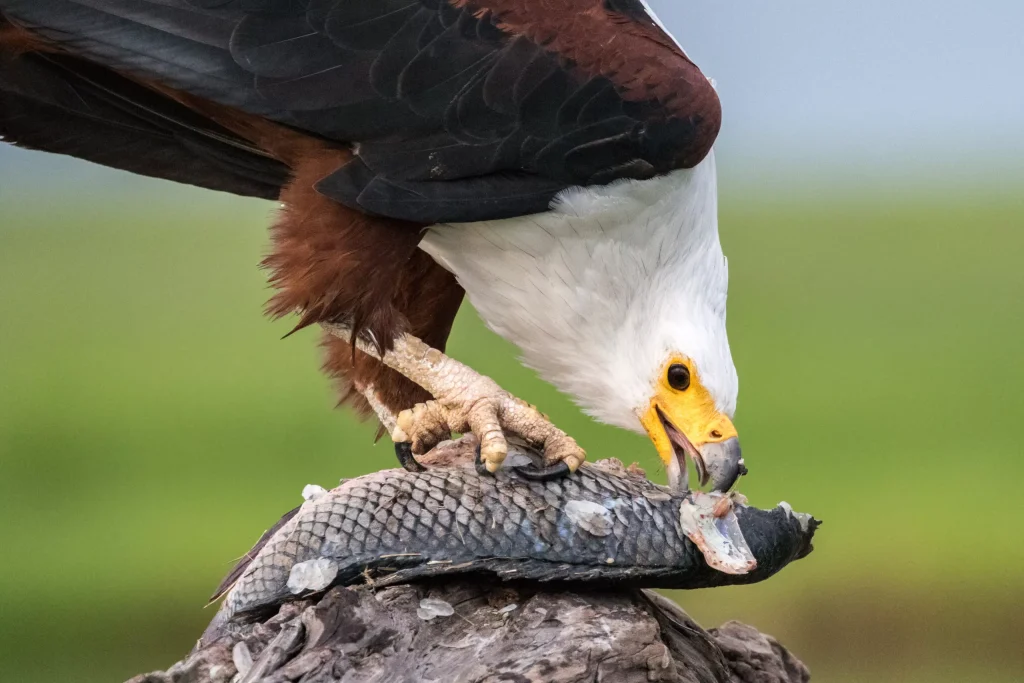
Another fascinating fact about the African Fish Eagle is its wide distribution across sub-Saharan Africa. The bird lives in diverse environments ranging in the East Africa great rivers and lakes to the wetlands and coastal activities in the West Africa region. It is not restricted to certain areas but rather, it flourishes in diverse environments where there is water accessibility.
Habitats and Distribution The African Fish Eagle is primarily associated with freshwater bodies, such as lakes, rivers, and wetlands. These regions have plenty of food which enables the survival of the eagle. The bird is prevalent in Lake Victoria, River Zambezi, and Lake Malawi, national parks and other protected areas in Africa.
The range of the African Fish Eagle extends from the western coasts of Africa to the eastern regions, and it can even be found in southern Africa, as well as parts of the Horn of Africa. It grows well in various ecosystems as it exists in tropical rainforests, savanna and dry regions as far as it has a steady supply of freshwater. Migration Patterns Unlike some bird species that migrate long distances, the African Fish Eagle is generally a resident species, meaning it does not engage in large-scale seasonal migration.
Certain groups of people however do engage in certain form of localised movements based on the supply of food and water. In places where the waters change seasonally, the Fish Eagle has the option of shifting to other regions under its boundary in search of more accommodating hunting territories.
The African Fish Eagle Is a Monogamous and Loyal Mate

A striking fact about the African Fish Eagle is that it forms long-lasting monogamous bonds with its mate. These eagles are famous in their ability to stick when it comes to pair bonding, and once they have become partners in life, they tend to remain together until death. This fidelity is especially prominent in the animal kingdom, whereby most species may undergo transient partnerships or have several switches of their mates.
Courting and Nesting The courtship process of the African Fish Eagle involves a series of aerial displays and synchronized flying maneuvers, during which the male impresses the female with his agility and strength. After a pair bond is formed, the pair works together to construct a big nest in tall trees along a water way. The nests are high up the trees, usually providing the couple with a good viewing position of the territory.
The nests are mostly composed of sticks, twigs, and branches and they are internally padded with soft materials including grasses and leaves. The nests become bigger and may be increased every year whereas the pair returns to the old nest and builds another layer on it. Fish Eagle nests have got an ability of growing so big and heavy that they may be utilized by a collection of generations of eagles in periods of many years.
General Parent Raising The African Fish Eagle typically lays two eggs, although only one chick usually survives to adulthood. The eggs are hatched by turn taking between the two parents and when the eggs hatch, both parents share the responsibilities of feeding and the chick. The young eagle is given fish and small animals to eat on and it is over time that it comes to learn how to hunt by watching its parents.
The chick will stay in the nest during several months until it will be able to fly and hunt independently. The close link between the two is important to the survival of the young, where both the parents are involved in taking care of their young ones by making them safe and secure.
5. The African Fish Eagle Faces Conservation Challenges

Despite its wide distribution and impressive hunting skills, the African Fish Eagle faces a number of conservation challenges. These are habitat depletion, pollution and human animal conflict which pose a threat to the sustainability of the species. Pollution and Habitat Loss Habitat loss and pollution are probably the most well known of disasters.
One of the primary threats to the African Fish Eagle is habitat destruction. With the increasing population, and development of people along waterways, their natural habitats are being taken away more and more. Dams, urbanization and construction of farms have also led to the disappearance of appropriate nesting sites as well as hunting places of the Fish Eagle. As well, industrial discharges, pesticides and wastes can pollute the fish that the eagles are dependent on as a food source that would affect their health and reproduction.
Human-Wildlife Conflict In some regions, the African Fish Eagle is also threatened by human-wildlife conflict. Fishermen especially can perceive the Fish Eagle as an enemy since rarely the bird plunders fish in nets or catches. Some fishermen, in defense, will attempt to force the eagles away or worse still kill them. This struggle, among other threats, has contributed to declining certain local populations of the species.
Conservation Efforts Conservation efforts are underway to protect the African Fish Eagle and its habitats. A lot of national parks and wildlife reserves are established in Africa and the species can live and reproduce there in a healthy environment and efforts are being made to minimise pollution and conserve water quality. Additionally, educating local communities about the importance of conserving the African Fish Eagle and its habitat is an essential part of ensuring its long-term survival.
Conclusion
The African Fish Eagle is an incredible bird, known for its powerful hunting skills, distinctive call, and strong family bonds. This species was fascinating with its legendary hunting styles, their amazing sight and monogamous behaviors; the Fish Eagle has attracted people throughout history with its beautiful features across the planet. However, like many species in the wild, the African Fish Eagle faces significant challenges that threaten its survival. Understanding these facts about the African Fish Eagle not only highlights the bird’s remarkable traits but also emphasizes the need for conservation efforts to ensure that this majestic bird continues to thrive in the African landscape for generations to come.

